After a long, fun-filled touring season in your RV, you may need to park and relax the tired old bones. Your biggest headache would be how you store your expensive solar equipment and also be able to prevent your priceless battery bank from damage by being idle over time.
Storing your solar equipment over a long period has its risks, especially the battery bank, which has to be kept at the optimum charge level to preserve its good operating state.
There are various ways in which your van can be stored, but this will generally depend on your budget at the space you have at your disposal. You can choose to park the van in your yard and forget about it till the next trip. Or you can choose to build a custom enclosure for your rig as well. Alternatively, you can also pay a company to will store, check, and secure it. Of course, this can be expensive.
The way you store your RV when not in use determines the condition of your vehicle system over-time. It can make or break you!
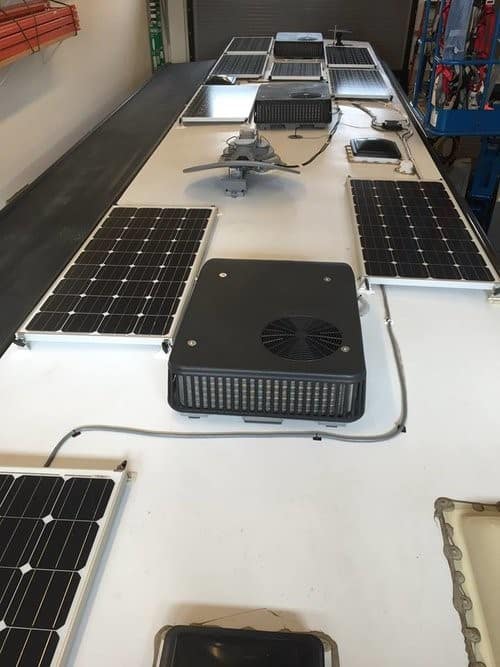
Disconnecting your solar power system either mechanically or physically, is the safest solution even though the battery bank will still discharge slowly over time. This also depends on where your RV is stored. If you cannot charge the batteries, it is better to take them home where the correct charge can be administered.
You choose to park your motor van in the yards, and it will endure the weather elements such as rain, snow, and temperature variations. Or you decide to put it in your garage or storage unit with an alternative powering its onboard solar system keeping everything neat and tidy.
Putting your motor-van under a carport affords extra protection that will assure you in tiptop conditions.
How to prepare your RV for storage
The van can be put on stilts or jack stands or rested on wheel chokes to prevent flat spots which damage tires. I highly recommend maxing the tire pressure to avoid flat spots. You can cover the tires with waterproof sheets to avoid UV damage as well.
I also highly recommend using an excellent anti-rust proofer or lubricant on stabilizing legs, wheel nuts, tow hitch, and anything that might rust shut. Ant Sand around the wheels, stabilizing feet, and jockey wheel will prevent ants and other bugs from crawling inside. This needs to be checked regularly. You’ll also want to check if any rodents got inside your motor bay or anywhere else. They can do considerable damage.
Your RV is an investment worth looking after and thus should be maintained in tip-top condition all year round. You will avoid any nasty surprises that can cost you a lot of money.
You need to be organized, and years after years, you’ll be better at this task. I strongly recommend you create a checklist to note everything you need to do after a trip. Rvdaily made a checklist example that you can get here.
Storage solutions for your RV.
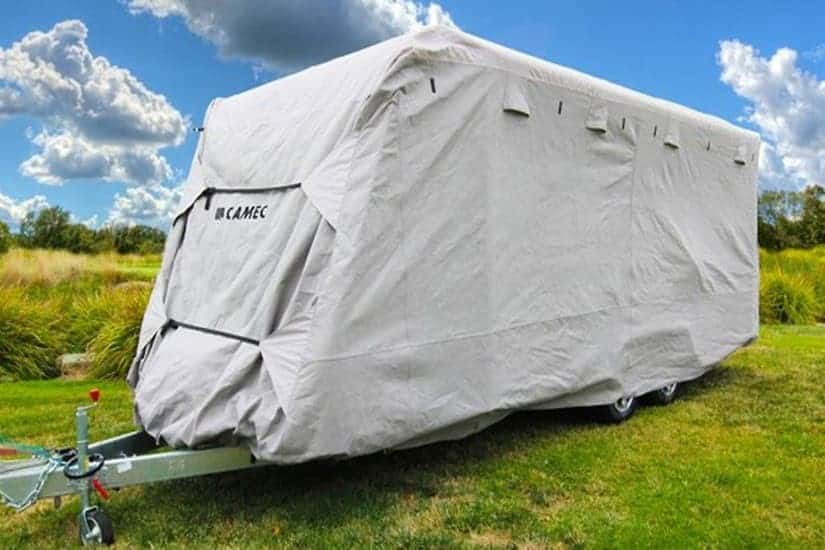
A motorhome stored over a long period suffers from several issues. The main problem affects your batteries if you have a solar system. They are generally expensive, and you don’t want to pay for new ones each year.
You can store your vehicle in any of the three ways articulated below and what you should do when securing your valuable solar equipment in an optimum condition :
A) You can Park your motorhome outdoors in the yard
- Make sure to log all electrical issues that you noticed before parking your motor van. Try to fix them directly.
- If possible, unplug your batteries and take them to your home. Batteries don’t like low temperatures, and you need to keep their charging state on an optimal level.
- Empty your water system. You don’t want to have to change it because it froze during Winter.
- You should switch off all electrical pieces of equipment in the motor-van.
- Use a tarp cover to offer small protection for your RV. Install and secure it correctly around the RV body to prevent any damage to the body.
- Cover all areas that can be affected by rust with a protective sheet.
- Regularly check your van for any damages or rodents’ invasion.
B) Parking your motorhome inside a garage
- You have the option to remove all batteries, especially folded or AGM, if there is no shore power to keep on charging the batteries.
- Make sure to log all electrical issues that were attended to before parking the motor van. Try to fix them as soon as possible.
- All electrical equipment should be shut down, and if shore power is available, the batteries should be trickle charged to maintain their condition.
- If you have lithium batteries, switch them off.
C) Parking your motorhome in a managed facility
- Make sure to log all electrical issues that were attended too before parking the motor van
- All electrical equipment should be shut down, and if shore power is available, the batteries should be trickle charged to maintain their condition.
- If you have lithium batteries, switch them off from the mains
Related Articles: Should You Remove RV Batteries in Winter? Slides In or Out? How Do You Store an RV?
How do you store your RV when not in use?
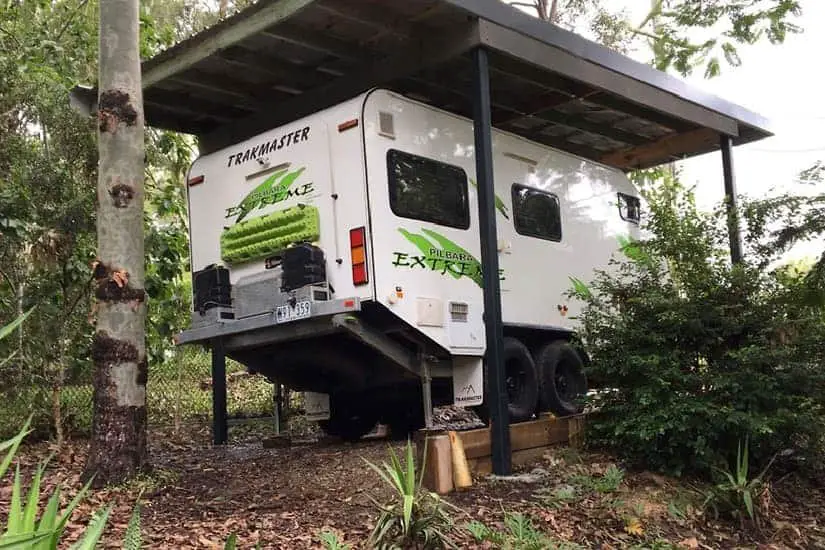
Getting your motor-van and its equipment ready for a lay-off involves spending a few hours cleaning the van from top to bottom and underneath.
Let`s run through how you can prepare your motorhome for storage.
Exterior
You have to clean the van thoroughly on the exterior and interior before putting it in storage. You can put in some elbow grease and wax the exterior surface to protect it from the weather elements.
Give the roof a good scrubbing clean. Clean all the undesirable elements on the top, such as bird droppings and dust, etc. These can deteriorate its condition.
Hosing down the roof will soften the dirt.
Interior
Give your motorhome a thorough clean before putting it in storage.
Use a hoover to reach the nooks and crevices. This serves to removes food scraps and crumbs. It can attract rodents that can gnaw on the electrical cables in the van.
Not only will this maintain your furnishings in excellent condition, but it will also deter potential thieves looking for valuables inside your RV.
As a theft deterrent, you can leave curtains and blinds open to show that there’s nothing to steal inside your van.
Consider defrosting and cleaning the fridge and freezer. Baking powder, vanilla essence, and bi-carb soda are some of the home remedies that will help draw away moisture and absorb smells.
Empty your water system to avoid freezing.
Rodents Control
A rat or mouse can be a menace when it enters the motor-van, gnawing on the cables and hoses.
Most van-lifers store their vans in their yards, but these areas are most likely to be home to rats and mice.
A good van storage site should be free from long grass and weeds, which provide shelter to rodents.
All crumbs and food waste should be thoroughly cleaned before the van is put into storage.
Consider parking your van where the risk is relatively minimal.
Water System
After a long season, consider draining away your fresh and wastewater tanks to avoid bacteria growth in the water system, which may lead to mold build-up in the van.
Empty your water system to avoid freezing.
Van Electrics
Check that all your lights are working correctly. If anything is broken, fix it directly. You don’t want to have your next trip delayed because you need to buy new light bulbs. Once everything’s OK, you can simply switch the van off with the main power switch.
If solar or 240V shore power is available, use an appropriate trickle charger to maintain your batteries’ charge state. Most appliances run digital timers, clocks, and other things, where if a light’s on, there is also a power drain. The appropriate charger will allow the battery to drain slightly and then recharge it to its maximum capacity.
Your Solar System
Your storage site has an impact on the overall performance of your van solar-powered system.
- Battery Bank
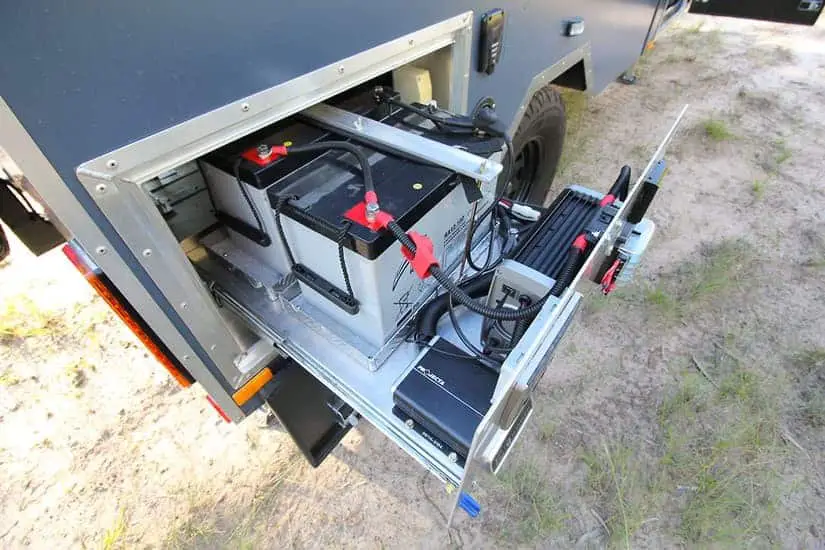
You need to have the right storage conditions to avoid any damage affecting your batteries.
Batteries should be kept in well-vented places that prevent a build-up of gas masses, leading to fires and toxic inhalation. The battery should be away from direct sunlight to protect it from speeding chemical processes within the battery. You want the environment where you store your battery to be stable, not too warm and not too cold, neither.
You can invest in a charge inverter that can trickle charge the batteries when not in use. It turns on whenever the batteries need to be charged.
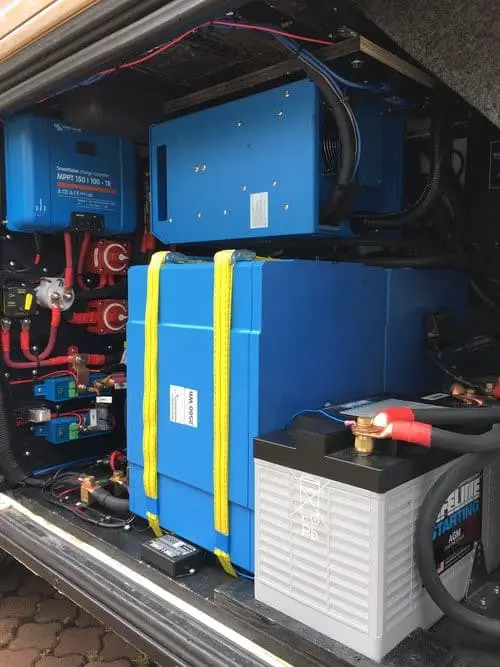
This technology ensures that the batteries are kept healthy and in working condition. A battery management system ensures that the battery temperature is controlled at all times. This system provides an emergency warning platform that detects any malfunctioning batteries within the battery bank.
It is brilliant and driven by sensor technology. It can monitor battery temperature and also regulate such. This system can also manage the charging rate of batteries, thus preventing any under or overcharging that can occur with the system.
This system works well for lithium batteries to ensure the correct and optimum charging of these batteries.
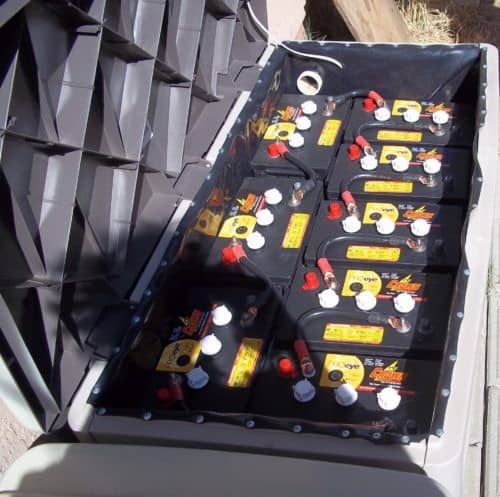
Refer to your battery manual on how low or maintenance-free batteries should be maintained to ensure constant efficiency and performance.
Preventive care and maintenance programs should be in place (service of the battery-water level, terminal cleaning, voltage checks, etc.). Some battery types require equalization to prevent sulphation internally by overcharging, and this should be done periodically to maintain battery health.
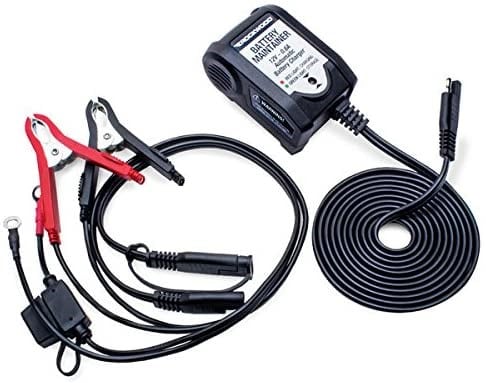
Batteries naturally discharge when put into storage. It is imperative to charge your batteries before putting them in storage. Solar batteries lose about 10% power every month, and you want to avoid an empty battery.
That’s where a battery maintainer comes in handy. This setup ensures that batteries stay topped up at all times. Be sure to check if the battery maintainer you want to buy works with your type of battery. Indeed, it can damage your lithium battery if it’s not made for this type of battery.
It is recommended to switch off lithium batteries to prevent current from entering or leaving the lithium battery bank.
Batteries are the most delicate and expensive part of an RV solar power system, and they need to be managed appropriately to maintain their health.
They should be climate monitored to stop them from under-going undesired chemical processes
A dry place that is well ventilated is the most ideal. The battery can be put on a trickle charge depending on the type to keep it topped while in storage.
How Do You Keep Your RV Battery Charged When in Storage?
Most RVs have ever draining loads like fire detectors, visor clocks, latest washing machines, etc., that slowly drain your battery over time. And even if you don’t have any electronic appliance using electricity, your battery will discharge on its own naturally.
It’s crucial not to completely discharge your solar battery bank for these two primary reasons:
- Batteries life is curtailed every time they drain below 50% (GEL & AGM)
- The electrolyte can freeze if the battery is completely discharged.
Ensure that you don’t store your batteries in sub-zero temperatures, a risk of the internal battery chemicals expanding and damaging the battery housing.
The following are several steps you can take to protect your RV batteries while the RV is stored for the Winter:
- Avoid sub-zero conditions by fully charging your battery
- Install a battery kill switch to keep phantom loads from draining your batteries.
- Keep your batteries at room temperature.
- Store your batteries in a well-ventilated room that is not subjected to direct sunlight or freezing conditions.
- Solar panels
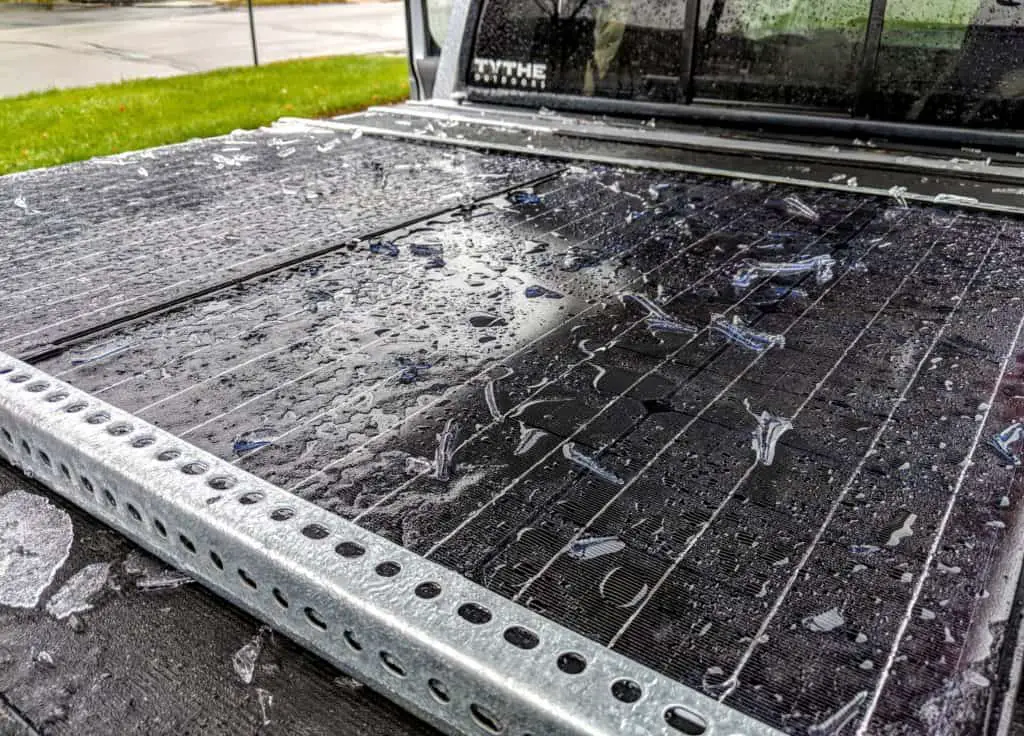
Solar panels should be kept clean at all times. Clean them with soapy water if there are dirt and grime on them. Rubbing alcohol can be used to wipe them if there are dusty. We made a complete article about cleaning your solar panels here.
If you have a charge controller (which is highly recommended), you don’t need to cover your solar panels when not in use. It will ensure that the RV batteries stay fully charged while parked, and it will automatically stop charging when they’re full.
Snow can be the main problem with storing your panels during the Winter. Indeed, the weight of a big load of snow can damage your panels. If you can, try to have your panels stored at an angle to let the snow slide off.
Alternatively, the solar panels can be removed and stored inside if you if can’t risk the thought of going outside and cleaning the panels during a snow storm.
- Charge Controller & Inverter
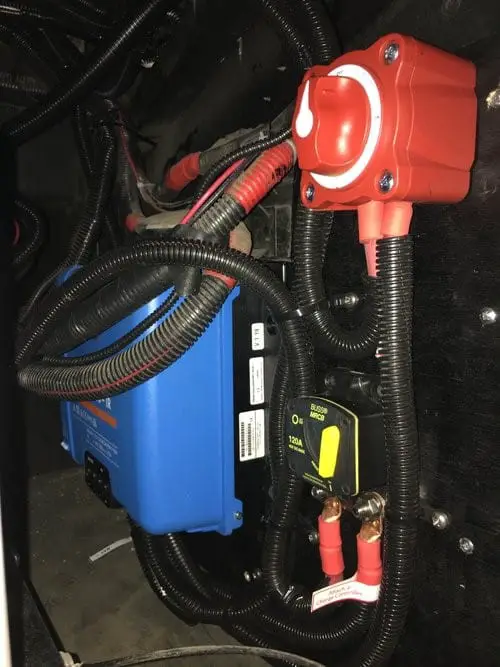
If there are not in use (you disconnected your solar panels), you can disconnect them from the system and tape off their wires to prevent any incidents
The storage conditions for the solar controller are usually from -31 to 175°F. You should find more information in its manual about the temperatures it can handle without being in use.
Essential Points to Note When Storing Your RV and Its Solar Equipment
- Check your insurance
Contact your broker because some insurers reduce their fees if your RV is parked at a specialist facility.
You will need to choose the best storage space as dictated by your insurer. You can add additional and enhanced security measures, including wheel lock nuts, clamps, steering locks, an alarm system, and Mobile app cameras, which may help lower the insurance premium.
- Security
Security is your best bet against theft. RVs tend to attract thieves because of the valuable equipment that is installed. It is very wise to strip your RV of any expensive equipment while in storage. There may be a need to fit additional security to your RV during this period.
Consider getting a parking spot away from the road if you have to park the RV within your yard. You can fit extra locks, wheel locks, and an alarm as a deterrent. You can also install a security camera powered by its own solar panel to monitor the area.
Conclusion
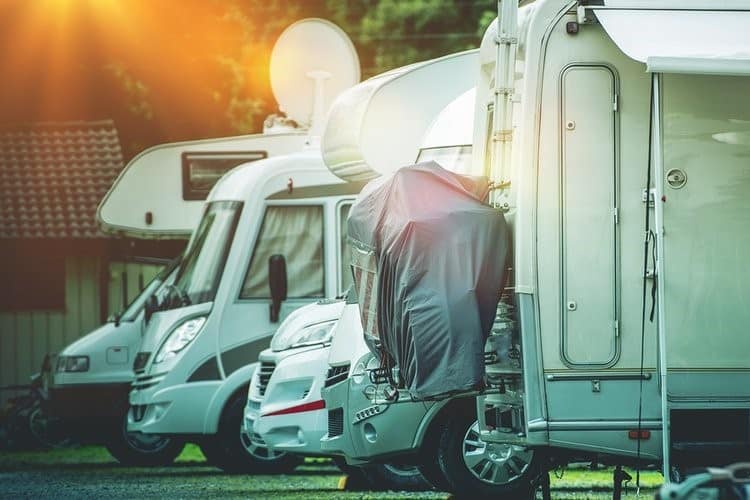
Getting a tow when you’re stuck out in the woods is also not Van-living. But when it does, properly storing your solar system will ensure everything is in the best possible condition when you roll your RV out. It is a cost saver — RV solar power systems are expensive, and setting out proper storage will preserve their performance, security and extend their lifespan.
